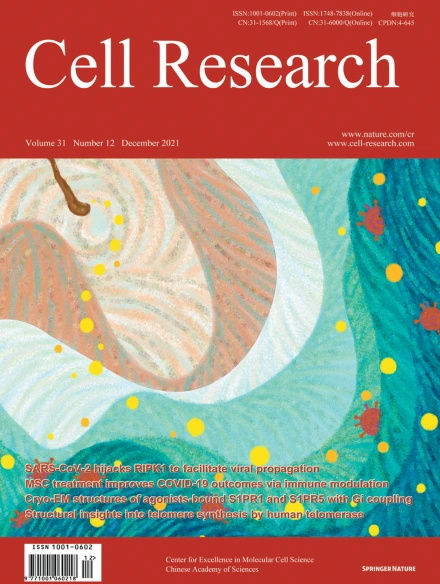
Advanced Search
Submit Manuscript
Advanced Search
Submit Manuscript
Volume 31, No 12, Dec 2021
ISSN: 1001-0602
EISSN: 1748-7838 2018
impact factor 17.848*
(Clarivate Analytics, 2019)
Volume 31 Issue 12, December 2021: 1244-1262 |
Mesenchymal stem cell treatment improves outcome of COVID-19 patients via multiple immunomodulatory mechanisms
Rongjia Zhu1,† , Tingdong Yan2,† , Yingmei Feng3,† , Yan Liu4,† , Hongcui Cao5,6,† , Gongxin Peng7,† , Yanlei Yang8 , Zhen Xu2,9 , Jingqi Liu5 , Wei Hou3 , Xiaoyue Wang7 , Zhe Li2 , Luchan Deng1 , Shihua Wang1 , Jing Li1 , Qin Han1 , Hongling Li1 , Guangliang Shan1 , Yinghao Cao7 , Xingyan An1 , Jianshe Yan2 , Zhonghui Zhang2 , Huafei Li2 , Xuebin Qu2 , Jiaqi Zhu5,6 , Shumin Zhou2 , Jiao Wang2 , Fengchun Zhang8 , Jinming Gao8 , Ronghua Jin3,* , Dayong Xu4 , Yan-Qing Ma9 , Tao Huang10 , Shuang Peng11 , Zhi Zheng1 , Ilia Stambler12,13 , Eric Gilson12,14,15 , Lee Wei Lim12,16 , Alexey Moskalev12,17,18 , Antonio Cano12,19 , Sasanka Chakrabarti12,20 , Brun Ulfhake12,21 , Huanxing Su12,22 , Haoying Xu1 , Sihuan Xu4 , Feng Wei23 , Holly M. Brown-Borg12,24 , Kyung-Jin Min12,25 , Georgina Ellison-Hughes12,26 , Calogero Caruso12,27 , Kunlin Jin12,28 , Robert Chunhua Zhao1,2,12,*
1Institute of Basic Medical Sciences, Chinese Academy of Medical Sciences, School of Basic Medicine, Peking Union Medical College, Beijing, ChinaThe infusion of coronavirus disease 2019 (COVID-19) patients with mesenchymal stem cells (MSCs) potentially improves clinical symptoms, but the underlying mechanism remains unclear. We conducted a randomized, single-blind, placebo-controlled (29 patients/group) phase II clinical trial to validate previous findings and explore the potential mechanisms. Patients treated with umbilical cord-derived MSCs exhibited a shorter hospital stay (P = 0.0198) and less time required for symptoms remission (P = 0.0194) than those who received placebo. Based on chest images, both severe and critical patients treated with MSCs showed improvement by day 7 (P = 0.0099) and day 21 (P = 0.0084). MSC-treated patients had fewer adverse events. MSC infusion reduced the levels of C-reactive protein, proinflammatory cytokines, and neutrophil extracellular traps (NETs) and promoted the maintenance of SARS-CoV-2-specific antibodies. To explore how MSCs modulate the immune system, we employed single-cell RNA sequencing analysis on peripheral blood. Our analysis identified a novel subpopulation of VNN2+ hematopoietic stem/progenitor-like (HSPC-like) cells expressing CSF3R and PTPRE that were mobilized following MSC infusion. Genes encoding chemotaxis factors — CX3CR1 and L-selectin — were upregulated in various immune cells. MSC treatment also regulated B cell subsets and increased the expression of costimulatory CD28 in T cells in vivo and in vitro. In addition, an in vivo mouse study confirmed that MSCs suppressed NET release and reduced venous thrombosis by upregulating kindlin-3 signaling. Together, our results underscore the role of MSCs in improving COVID-19 patient outcomes via maintenance of immune homeostasis.
https://doi.org/10.1038/s41422-021-00573-y